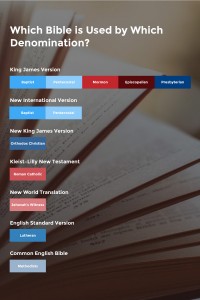Last summer while on a mission trip in the deep hollers of the Appellation mountains, our crew ended up working on a roof for an old Independent, Fundamental, KJVO, Baptist preacher. While we all grew to love him over the course of the week we were also all a bit tickled by how he introduced himself to the group. The first words out of his mouth was a welcome, his name, and the fact that he was a KJVO preacher and (I quote) “all other versions are a per-version.” While we all chucked at the fiery old preacher I couldn’t help but think of what he was like 30 years ago as a younger man, forcing people to give up their readable translations for the KJV, since apparently that’s the only way to salvation…… But I digress.
As many of the DOTB readers already know, the KJV is no-where near to my heart. Either way, it appears that a recent study done by Bluefield College, in Virginia, has discovered that the KJV’s stronghold may be waning. It is still the #1 sold and read translation but that appears to be changing.

The study asked participants which translations of the Bible they read and preferred. The top two choices were the KJV which was read by 78.5% of participants, and the NIV which was read by 70.6% of participants. Among non-Christians the NIV was by far the most popular.
What is interesting is that two of the denominations seemed to be split between the KJV and the NIV. The Baptists and Pentecostals both reported using the NIV a significant amount which may fly in the face of the commonly held belief that fundamentalist denominations will only use the KJV. While it is true that most KJVO churches are fundamentalist churches, it must also be true that a significant number of these churches have modernized and found the benefit to using a Bible translation that is readable.
Why is any of this important?
It might not seem important to most but I believe this is a good trend. Once again, I have nothing against the KJV. I just want to see and end to the KJVO movement that has turned so many Christians against each other. We now have dozens of Bible translations that are updated with the best information from newer lexicons and translators have a much better tool set to work from than when the KJV was done in 1611.
Additionally, we have many more manuscripts today to work form than we had in 1611. In fact, the translators lacked so many manuscripts in Greek and Hebrew that they had to back-translate portions of the Latin manuscripts before putting into English. So, today we have much more diversity in the manuscripts we have to translate from, as well as a more complete set. We also have older manuscripts which help immensely with understanding textual variants that have crept into the texts over the centuries. People get squeamish talking about it but the texts for the Bible do not all agree which is why it’s important to have as many copies as possible from as many locations and time periods as possible so that scholars can better understand which variants best represent the original texts, or what is perceived to be the original texts.
All that being said, I am all for reading the KJV as long as people are humble enough to not force it upon others who feel much more comfortable with the language used in the NIV or ESV, etc.
